[Bianculli here -- DAVID Bianculli here, that is: I'm even more proud than usual to introduce the newest writer in our ever-expanding TV WORTH WATCHING stable: He's Mark Bianculli, my son. He grew up watching quality TV (how could he not?), was a TV critic for his college paper, and the same week I launched this website in 2007, he moved to Hollywood, hoping to write for television rather than about it. Until that happens, I've persuaded him to join us here. He's a better writer than I was at his age --and since he's only 26, he lowers our correspondents' average age the way Anderson Cooper does on 60 Minutes.
Please welcome him, as he starts off by considering what makes good TV so good in the first place...]
 It's Not the Story, It's the Storytelling
It's Not the Story, It's the Storytelling
By Mark Bianculli
"So," it began, "what do you want to do out here?"
My immediate answer: "TV writer."
The unimpressed response: "Interesting. Why television?"
Maybe this wasn't going to be the smoothest job interview with a talent manager who made his living off of motion pictures. But I needed the assistant job. I thought for a moment.
"Because it's character-building."
While I got an unintentional laugh out of it, what I was actually trying to say is that unlike movies, television's unique strength is the ability to develop characters to their finest and fullest. To truly build characters.
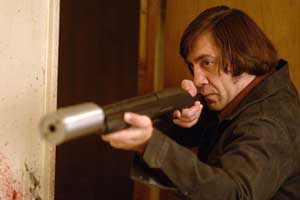
Now, that's not to say that movies don't deliver some of the greatest characters of all time. Of course they do. All I'm suggesting is that when you watch such amazingly drawn characters as Col. Hans Landa in Inglourious Basterds, or Anton Chigurh in No Country for Old Men, or Sgt. William James in The Hurt Locker, you're only left wanting more.
When you watch Don Draper in Mad Men, however, or Walter White in Breaking Bad, or Dexter Morgan in Dexter, more is exactly what you get.
But this begs another question. Which is better? Isn't the cardinal rule of show business to always leave them wanting more? Don't TV shows eventually jump the shark and turn groundbreaking stories into tired, threadbare routines?
Well, yes and no. Some stories only need so much time to unfold, and need to go only so deep. Some things are better left unexplained or unfinished. But when you have seventy hours to explore your characters instead of two, you inherit the ability to make their relationships that much more complex, and to strike that many more chords with the emotions of your viewers. To this effect, a good movie is like a riveting short story. Good television is like a novel.
Taking this analogy a step further, consider your favorite novels. If asked why you like them so much, would it ever come down to how good the ending was, or the action-packed plot points? I'd bet that nine times out ten, it was the lyrical prose, the soulful insight, or the carefully crafted subtleties that kept you turning the pages. In other words, it's not the story that ultimately grabs you, but the storytelling.
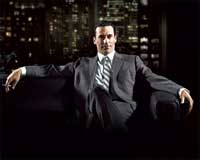
This is why it's no surprise that a show like AMC's Mad Men is being heralded as the next great American novel. A period piece set in a time of extravagance and social change, with themes of truth and identity and class-rising woven throughout, this show begins by introducing us to one of the most fascinating characters in years, Madison Avenue ad exec Don Draper. A slick, mysterious, philandering alpha male who drinks, smokes, and cons his way to success -- who wouldn't want to watch this guy?
But Mad Men wouldn't necessarily work as a movie. The dark secret of Don's past is revealed quickly, and it isn't all that dark. The key to this show's success lies rather in the ability to slowly (and cleverly) dig deeper and deeper into the lives of the ensemble as well as Don, and to let the drama stem from human emotion, not action.
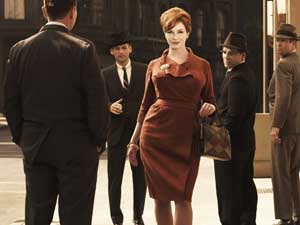
Writer-producer David E. Kelley's mantra on writing good characters was simple: make every character interesting enough so that you would be perfectly happy to follow them out of the room. In the case of Mad Men, literally every single character becomes more and more interesting with each minute of screen time.
By the end of season three, Joan, Peggy, Roger, Peter, and Betty are all Don Drapers in a sense, with enough intrigue and dynamism to make us eagerly follow them anywhere. In the movies, this would be impossible. No matter how fascinating the supporting characters, we would never have time to "leave the room." (Fine, maybe in Lord of the Rings).
But Don Draper and company are members of just one in a long line of stellar ensemble shows. Breaking Bad (also on AMC) approaches its story in a completely different style, turning and twisting violently at the surface over deeper themes of love, family, and virility. Here we have a lead character who, until a gradual transformation, is the anti-Don Draper.
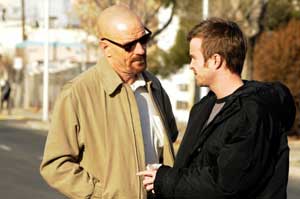
Walter White (played by two-time Emmy winner Bryan Cranston) is a terminally ill high school chemistry teacher who teams up with a former student (played by Aaron Paul) to build his family a nest egg by selling crystal meth. From the very opening shot of the pilot, we are being dared to catch up to a story that is rushing by us at a frenetic pace.
Vince Gilligan pulls out some of his classic "teaser" tricks from his days on the X-Files, and taunts viewers with hints and misdirection, ultimately delivering some of the most inventive and well-crafted TV storytelling in years. And throughout the immediate dangers and dire consequences, we slow down enough to catch beautiful dialogue and deep emotional struggles. Add its wonderful humor, and you've got a show that carefully (and impressively) hits every note a viewer could possibly want.
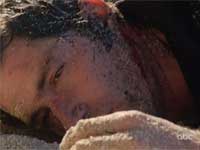
Breaking Bad is indeed very different from a show like Mad Men. But the effect is the same: a web of wonderfully complex characters whose stories end up trumping the original series hook. Same goes for the The Sopranos, The Wire, Six Feet Under, Lost, Treme, Dexter, Damages, and countless others. All stories which, because of television, are given the time to plant proper seeds, to navigate through different perspectives. To write the novel.
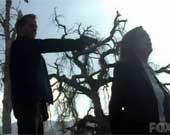
Now, I realize this argument is a generalization, and that both sides are full of exceptions. Shows like 24 and CSI: Crime Scene Investigation aren't exactly based on the novels of Proust, and there are plenty of movies (The Lives of Others comes to mind) that prove just how subtly and passionately a human drama can be told.
But one thing is certain. Television, like life, lets us truly get to know people. Slower burns make for bigger payoffs. Breakups hurt more, and victories taste sweeter. Endings and beginnings become less easily defined.
Unlike the ephemeral quality of movies -- that perfect snapshot into the most interesting moment of one's life -- TV, at its best, sticks around for the long haul. It shows us what happens after you get the girl, or better yet, after you never get the girl. It stays with us long after we've lost our loved ones, or reaches back to a time before we even met them. It tells a complete story, for better or worse. There's something courageous in that.
So three years, two jobs, and one internship later, my convictions are exactly the same as they were in that very first interview.
When asked? My answer: always, and immediately:
"TV writer."
--

Mark Bianculli is former TV columnist for his high school and college newspapers, occasionally writing a feature or two professionally. After multiple internships on television shows and two-and-a-half years in talent management, he is still writing scripts and waiting for his chance to be a professional TV writer. And waiting... and waiting...